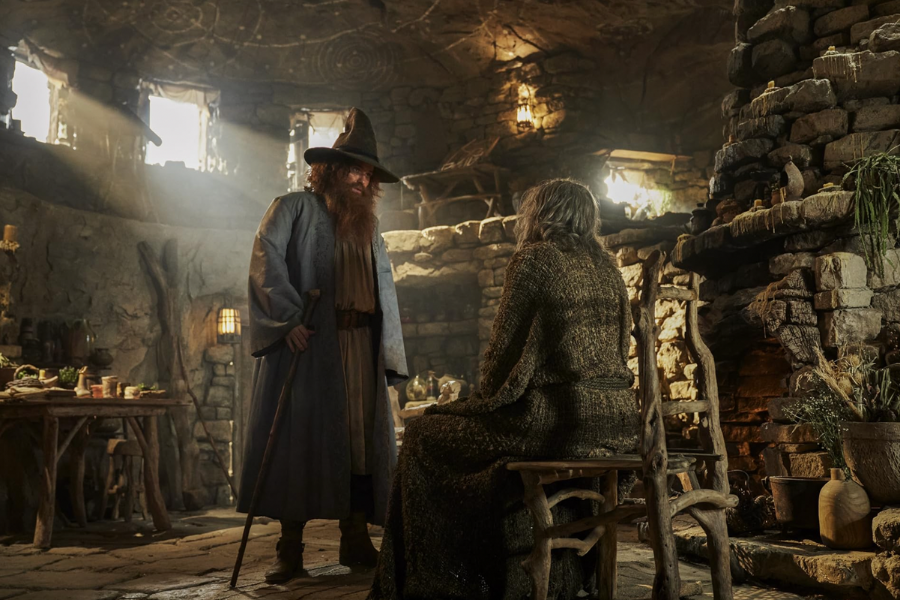Warning: This review contains spoilers.
In its 2022 debut season, Amazon’s mega-budget fantasy series “The Lord of the Rings: The Rings of Power” premiered with higher expectations than the Misty Mountains. But, the prequel to “The Hobbit” and “The Lord of the Rings” did not necessarily prove up to the mark. Season two, though very crowded, is an immense comeback from the deeply unfocused, expositional first season, delivering on the promises made by its predecessor and offering much more for exploration.
Set thousands of years before J.R.R. Tolkien’s “The Hobbit,” the show mixes in enough familiar faces with new characters, marking a first time foray into Tolkien’s history of the fabled period. The characters are described by Tolkien as “older than old,” focusing on origin stories and creating rings of power. Tolkien’s Middle-earth world, in most cases, was previously reduced to a passive fantasy epic inhabited by characters and storylines that made more future promises than twists and turns. Where season one did meet the mark, was its interpretation of many of Tolkien’s most iconic characters.
This consistent representation carries into season two, though on this occasion they find themselves in stories of much higher stakes and more deeply rooted in the structure and history of Tolkien’s world. It picks up right where its predecessor left off: in utter chaos. The Elven Rings of Power are now forged. The Orcs took over what is now Mordor. A mysterious stranger embarked to the East with two young hobbits. Númenor is in political disarray, and the Dark Lord’s hidden identity being exposed.
The strongest and most central plotline of the show revolves around this Dark Lord. Celebrimbor (Charles Edwards) — at the hands of the great deceiver Sauron (Charlie Vickers) and in disguise — once again takes center stage. Not since Bernard Hill’s Theoden or Ian McKellen’s Gandalf in Peter Jackson’s “The Lord of the Rings” films has anyone captured the true splendor of the Tolkienian language, with such a deft touch with its linguistic rhythms and movements. Edwards beautifully navigates the obsessed nature of the great Elven craftsman, and embodies his slow descent into madness in a way that truly makes the heart ache at the falling of such a mighty master of his craft. All the while, we are finally let in on the inner thoughts of a revealed Sauron, who is slowly manipulating and torturing Celebrimbor’s mind as he leeches his finest work out of him. He begins to use his creations — the show’s eponymous Rings of Power — to sow his influence throughout Middle-earth.
Orbiting around this, though, is a panic over the restorative power of the three Elven Rings wielded by Galadriel (Morfydd Clark), High King Gil-Galad (Benjamin Walker) and Círdan the Shipwright (Ben Daniels). Elrond (Robert Aramayo) remains suspicious of these rings, not fully believing them to be independent of Sauron’s influence. They then engage in a race against time and Adar’s (Sam Hazeldine, replacing Joseph Mawle) Orc legions as they desperately attempt to reach Celebrimbor in Eregion, to warn him that Halbrand, Sauron’s season one form, is not who he seems.
The finale sees Gandalf confront the Dark Wizard (Ciarán Hinds), finding his staff and discovering his name under the stars with Tom Bombadil, culminating in a moment of sheer Tolkienian magic as the two share a song under the night sky. It is these moments that cement “The Rings of Power” as a true adaptation — new stories spring from the source material, but retain the magic of the page.
The show, as one can tell, is very busy. In its eight episodes, the season maneuvers between these plots somewhat haphazardly. Certain characters and plotlines — mainly the entire kingdom of Númenor — get nowhere near as much attention as they should have. Meanwhile, stories such as the spoon-fed journey toward Gandalf’s identity, did not need so much focus.
However, the main attention was exactly where it needed to be, in Eregion with Celebrimbor and Sauron, and Edwards and Vickers’ beautiful and nuanced performances. Every performer gives us sheer magic onscreen. Aramayo, Clark and Daniel Weyman particularly shine, further differentiating themselves from the original performances while maintaining a truth to Tolkien’s characters. Through a completely new character, the audience receives deep Tolkien references that many never dreamed of seeing on screen, even down to linguistic histories. All of these references to the lore truly add to the world of the Second Age, bolstering an already rich visual environment beautifully complemented by Bear McCreary’s tantalizing score that weaves all of the emotional threads of the stories together.
Contact Joe Paladino at [email protected].


























































































































































